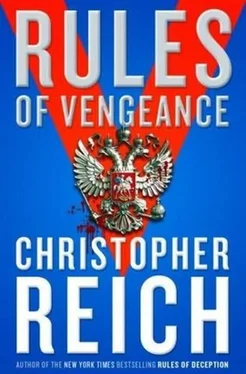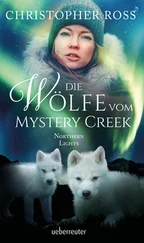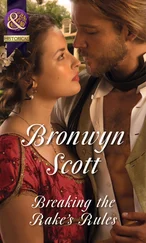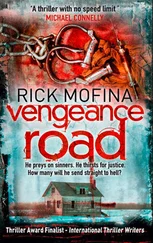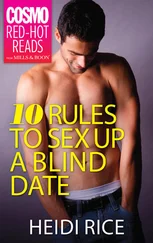Born in Siberia fifty-five years earlier, Piotr Chagalinsky was orphaned young and raised by his grandmother. A brilliant student, he obtained a scholarship to Moscow State University and subsequently graduated at the top of his class. After the obligatory stint in military service, he took a job with one of the USSR’s largest oil producers. By twenty-seven he had risen to vice chairman, a rise all the more unbelievable because of his refusal to join the Communist Party. When the Berlin Wall came down and Russia’s ossified government crumbled with it, Chagalinsky-by now rechristened Chagall-was in a perfect position to take advantage of it. He moved to modernize the oil company, boosting production while gobbling up smaller rivals and ensuring that a majority of the newly privatized company’s shares ended up in his pocket. It was this propensity to swallow up his rivals, along with his shock of blond hair, that lent him his nickname. The Great White.
And then, five years ago, Chagall had up and sold the company back to the Russian government for 10 billion pounds. The move was without warning and left many scratching their heads at the real reason for his departure. The next day he was on a plane to Britain. “I am finished with Russia and Russia is finished with me,” he’d announced famously. But like so much else about Chagall, it was a falsehood. Chagall was Russian to the core. He would never be done with the Rodina, and his involvement with Robert Russell proved as much.
“Welcome!” called Chagall in his thick Russian accent, opening the car door before Graves could cut the engine. “Captain Graves. It is a great pleasure.”
“Good of you to see me.” Graves let the intentional demotion go without mention. Already he had his first clue that Chagall was in hot water. Billionaires did not curtsey to the police, not in Russia or in Britain.
“How could I turn down a request from the Security Service? I am a citizen now. A subject of the queen.”
“Congratulations.” Graves wondered how much a UK passport had cost him. The house had gone for 30 million pounds, his football team for 200 million. Whatever it was, Chagall could afford it.
“You’re here about my friend Robert,” said the Russian mournfully. “This I know. To tell you the truth, I had been expecting your call.”
“Does that mean you have something to tell us?” Graves had no legal means of making Chagall cooperate. It was hardly against the law to meet with a man two hours before he was killed. If Graves wanted something out of Chagall, he’d have to trade for it.
“Perhaps,” said Chagall. “But I was hoping that you had something to tell me.”
“I might know a thing or two.”
Chagall gripped his arm and led him around the side of the home. “How did they get to him?”
“Through the basement,” said Graves.
“But he lived on the fifth floor. He had so much security-the alarms, the doormen.”
“They used the building’s old laundry chutes to move around without being detected.”
“Who? This I must know.”
“I can’t share that information with you. The investigation is ongoing.”
“Really?” Chagall shot him an inquiring look that might as well have telegraphed a bribe. How much did Graves want? Ten thousand pounds? Fifty thousand? One hundred?
“You’ll know as soon as we make an arrest,” said Graves.
“So it is soon?”
“We hope so.”
Chagall led the way through immaculately trimmed topiary, the hedges cut in the shapes of circus animals: an elephant, a lion, a dancing bear. Here and there along the perimeter of the tall brick walls that surrounded the property, armed guards lurked in the shadows, cradling submachine guns as they made their rounds. In the space of five minutes, Graves counted three teams of two and six television cameras. The palace wasn’t a home so much as a fortress. He said, “Tell me, Mr. Chagall, had you been friends with Lord Russell a long time?”
“Long enough. He was helpful.”
“How so?”
“He did not believe. He was not fooled like all of you others.”
“Fooled by what?”
“Look around you. You see the guns. My little army. What do you think? He was not fooled by them.”
They emerged from the topiary. A large farmhouse stood up ahead, with great green doors. The sound of an engine revving came from somewhere inside it.
“We have pictures of your car in front of Lord Russell’s club the night he was murdered. After the two of you met, Russell drove to Victoria Street, the site where the car bomb attack against Interior Minister Ivanov took place. Do you have any idea why he might have felt compelled to go there so late at night?”
“Devils,” said Chagall, with venom. “Evil men. You have no idea. They wear nice suits. They speak English perfectly so you think they are all right. Men you can deal with-like Mrs. Thatcher said about Gorbachev twenty years ago. But you are naive. Not these men. You cannot deal with them. Russia was born out of a swamp. For ten centuries we have struggled. Always the poor man of Europe. Ignorant. Superstitious. And now a miracle has come to save us. Do you know what that miracle is?”
“Oil?” ventured Graves.
“Oil,” said Chagall. “Russia holds the second largest deposits in the world. Two hundred billion barrels. We used to pump over nine million barrels a day. But no longer. The men who control the oil companies would rather keep all the profit for themselves than split it with others. Instead of modernizing our drilling platforms with partners from the West, they allow the rigs to grow rusty. Instead of exploring for new deposits, they guard the old ones like jealous hens. The problem is that the men who have taken control of our country’s natural resources are not businessmen. They are spies, and spies are paranoid and stupid. They look constantly over their shoulders, but never straight ahead. They say that they are patriots who bleed for Mother Russia. I have decided, Captain Graves, that there is nothing scarier than a patriot.”
They had reached the farmhouse. The sound of the engine was louder now. Someone pumped the accelerator as voices called out instructions in Russian. Chagall opened a side door and entered. The farmhouse had been converted into a garage. Graves counted at least twenty automobiles parked under a canopy of heavy-duty floodlights. There was a Ferrari Scaglietti and a Lamborghini Miura. A Maserati Quattroporte and a Mercedes McLaren SLR. A Porsche 911 GT and a Bentley Mulsanne Turbo.
Chagall stopped in front of a sleek gray two-door sports car. “The Bugatti Veyron. The most expensive car in the world. Do you know how much it costs?”
Graves smiled politely. “A bit more than my salary, I’d wager.”
“Two million U.S. I will tell you something. If you tell me who killed Robert Russell, it is yours. No questions asked. My gift to you. What do you say?”
“Tempting.”
“It is yours, then!” declared Chagall.
“I can’t accept.” Graves shook his head politely as if awed by such a show of largesse.
“Hah!” shouted Chagall. “Another patriot.”
Graves grew serious. “Why did Russell drive to One Victoria Street immediately after meeting with you? What do you know about the attack that took place there?”
Chagall busied himself with a chamois cloth, polishing the hood of a vintage black Ferrari Daytona. “Like yours, our investigation, too, is still ongoing,” he said without looking up. “Perhaps we shall inform Her Majesty’s government when we have accumulated more reliable information.”
Graves stepped to his shoulder. “The attack on Interior Minister Ivanov was a decoy to force a mandatory evacuation of the government buildings in the vicinity so that someone could get inside and steal classified information.”
Читать дальше
